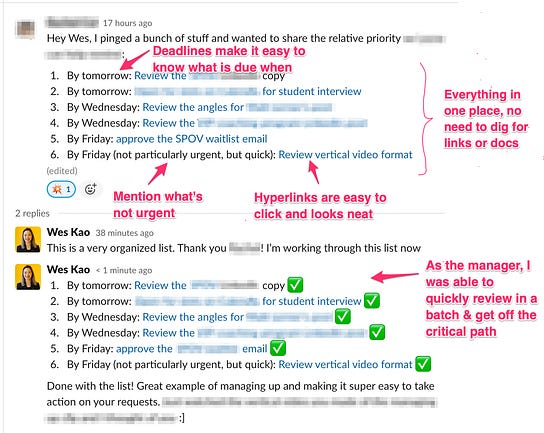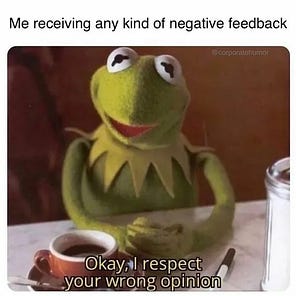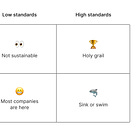Managing up: 11 principles for getting better feedback
Managing up: 11 principles for getting better feedbackThe truth about why your manager isn’t giving you more feedback--and what to do about it.👋 Hey, it’s Wes. Welcome to my weekly newsletter where I share frameworks for becoming a sharper operator, rooted in my experience as an a16z-backed founder. ✨ If you’re interested in sponsoring this newsletter to reach 30,000+ thoughtful operators, fill out this form and I can share more. In this week’s newsletter, we’ll cover how to get more and better feedback from your manager:
Read time: 8 minutes When people don’t get enough feedback from their manager, they often think, “My manager must be too busy.” This might be the case. But before you jump to that conclusion, consider that there’s more within your control than you think: Did you make it easy for your manager to help you? Did you ask a vague question? Do you behave like someone who your manager would want to invest in? These are all factors within your control. When you take these into account, you could dramatically change how much feedback you’re able to get. If you have a manager who has high standards, here’s how to get more and better feedback from them. 1. Make it insanely easy for your manager to give you feedback.If you only say “I’d love to get your feedback,” your manager might not know where to start. If you ask more specific prompts, it gives them more to react to. One of my direct reports sent this Slack DM and it's a masterclass in simple, direct communication: No guessing where to find docs. No follow-up questions on timing. No confusion about priority levels. She made it easy--and in less than 1 hour, I was able to provide feedback, give approval, and remove myself as the bottleneck for her projects. Make it easy for people to give you what you want. Every bit of friction prolongs the time you’ll have to wait for your manager to reply. 2. “Feedback” might feel loaded. Ask what to do differently and what worked well.Whenever you send work output for your manager to review, this is a good time to ask for feedback. You can say:
You can get “feedback” without it being framed as feedback, so keep your eyes on the prize and don’t get bogged down with semantics. Try asking more specific questions to see if it leads to more or better feedback from your manager. 3. Give them permission to rip your work apart.This one is important. Encourage your manager to be extremely direct with you. Many managers have learned the hard way that they need to carefully phrase their feedback and “translate” what they think into words that will be more acceptable for their direct reports. Otherwise, they risk being seen as insensitive or mean. Here’s what I’ll say: Managers should consider how they deliver feedback AND direct reports should toughen up about hearing feedback. Both parties should do their part. If you’re a direct report, you do not want your manager to feel the need to “translate” too much because reduces the chances they’ll give you feedback at all. You benefit when your manager can speak freely with you. You can say, “Feel free to be super direct. If this sucks, tell me and share why/how I can improve because I want to learn. Feel free to rip it apart.” 4. Don’t romanticize feedback. You might already be getting it—you just wish it looked different.In my early twenties, I wished I had a manager who would “coach” and “mentor” me. I wanted this so badly. One day, I realized, my manager taking the time to rip my work into shreds and explaining their thought process with actionable edits… This WAS coaching me. This WAS mentoring me. I was too busy whining about wanting a mentor to realize, in fact, I was being mentored. I’m sure there are official definitions for mentoring vs coaching vs whatever else, but for the purpose of this, I basically mean someone who will invest in your growth and give you concrete feedback to help you improve. Don’t romanticize feedback. Coaching, mentoring, feedback, etc doesn’t only show up in the form of career conversations. If your manager is letting you know what you could do better, that’s feedback. 5. Give your manager something concrete to react to.It’s easier for folks to give you feedback on a piece of work product you can both see in front of you. This serves as a jumping-off point for further discussion. There’s a psychological principle called recall vs recognition. It’s easier for people to recognize something on a list than to recall from scratch. Here’s how the Interaction Design Foundation describes this:
This applies to giving feedback:
^ This is tough. Your manager has to think of how to teach you this intimidating, complex, large topic of strategy. They don’t have time or the desire to create a curriculum for you and guide you step by step.
^ Here we go. This ask minimizes cognitive load and is less intimidating to tackle, so it invites your manager to teach you about strategy on the job. 6. Don’t expect your manager to create a structured lesson plan for you.It’s not your manager’s responsibility to teach you. It’s their responsibility to create the circumstances for you to learn. There’s a difference. Sometimes this involves sitting down and teaching you, but 95% of the time it involves you taking the lead, learning on your own, and keeping your manager informed on what you need (budget, reimbursement for a course, access to resources). In an ideal world, formal learning would happen during work hours. But in my experience, when I’m getting up to speed on a new channel, technology, or skill, I almost always learn after work or on weekends. There was simply too much happening during normal business hours. Whether you want to invest time after hours to learn is up to you. I’m sharing so you don’t beat yourself up for never seeming to have time to learn during work hours, and so you can set realistic expectations for yourself. 7. React positively when you get feedback.69% of managers are afraid of communicating with their own employees. This is nuts. It’s very possible your manager isn’t sharing more feedback because they’re worried you’ll take it badly. When you react negatively, your manager is disincentivized from engaging. They might say they “don’t have time” but that’s only partially true—the reason is as much about emotional labor. You may think you already react positively, but you probably have room to “overcorrect” at the beginning to build trust:
I’ve had folks tell me they wanted direct feedback, then get upset when I gave it to them. Reacting overtly positively helps convince your manager that you really mean it. 8. Frame why giving you feedback is ROI positive. It’s not always obvious or true.Most direct reports don’t realize how much effort goes into giving feedback. “Giving feedback” isn’t a single step—it’s actually multiple steps, including:
If your manager isn’t quick to give you feedback, it might be because they don’t see the upside to doing all this. They would rather spend their time on other more highly-leveraged tasks. To increase your chance of getting them to engage with you, you may want to sell them on the upside: If you have this answer, how will it help you save money or make money for the company? If you don’t get this, how will it cost the company? If your response is “getting an answer doesn’t really impact my ability to save or make money,” your question might not be worth the time to discuss. Most senior leaders are ruthlessly focused on driving value for the firm, so if answering your question doesn’t contribute to that, it makes sense why they’d deprioritize it. 9. Specify what part you need help with.Don’t forward a 17-email deep thread and say, “Thoughts?” This drives me crazy. If you forward me this thread, I don’t know what’s going on and what you need from me. I do NOT have time or desire to be a detective to piece everything together in order to help you. Assume your manager doesn’t have context. Do not drop them in the middle of the jungle and say, “Hey, hack your way through the trees and come to a path, figure out what’s going on. Once you do all that, please help me.” If you want them to help you, drop them 2 inches in front of the problem and say which part you need help with. Ask yourself:
10. Be explicit about the type of feedback you’re looking for.There are many ways your manager can support you. When you share what you need directly and respectfully, you’re more likely to get it. Don’t make your manager guess. Before: “Hey, can you take a look?" After:
11. Be the kind of operator managers want to invest in.At the end of the day, managers invest in people they believe are worth investing in. It’s a bit circular and common sense, but it’s worth saying because there are a few implications. Generally, you want to behave as someone who learns quickly, is going places, and is a strong performer. You want to act like an owner and do what’s best for the business. When you have a history of good judgment and continuous improvement, this makes your manager want to give you more feedback. I’d love to get your help growing our community of thoughtful, rigorous operators. If you enjoyed this post, consider taking a moment to: |
Older messages
How to get an enthusiastic yes
Wednesday, March 13, 2024
Most people suck at asking for things. Here's an easy framework for how to ask (and get a yes). ͏ ͏ ͏ ͏ ͏ ͏ ͏ ͏ ͏ ͏ ͏ ͏ ͏ ͏ ͏ ͏ ͏ ͏ ͏ ͏ ͏ ͏ ͏ ͏ ͏ ͏
How to interrupt (and be interrupted) respectfully in the workplace
Wednesday, March 6, 2024
Your goal is to get a shared understanding—not to deliver your full monologue. Don't run out of time for the important stuff. ͏ ͏ ͏ ͏ ͏ ͏ ͏ ͏ ͏ ͏ ͏ ͏ ͏ ͏ ͏ ͏ ͏ ͏
Sign posting: How to reduce cognitive load for your reader
Wednesday, March 6, 2024
When you're sharing complex ideas or writing long memos, use sign posting to guide your reader.
Work requests are not “favors”
Monday, March 4, 2024
Framing a work request as a favor uses social capital and makes you look incompetent. If your request is reasonable, ask respectfully and confidently. ͏ ͏ ͏ ͏ ͏ ͏ ͏ ͏ ͏ ͏ ͏ ͏ ͏
The #1 question every business case should answer
Monday, March 4, 2024
When you frame your recommendation in a way that gets heard, you increase the chances it gets adopted. Here's how. ͏ ͏ ͏ ͏ ͏ ͏ ͏ ͏ ͏ ͏ ͏ ͏ ͏ ͏ ͏ ͏ ͏ ͏ ͏ ͏ ͏
You Might Also Like
🚀 Ready to scale? Apply now for the TinySeed SaaS Accelerator
Friday, February 14, 2025
What could $120K+ in funding do for your business?
📂 How to find a technical cofounder
Friday, February 14, 2025
If you're a marketer looking to become a founder, this newsletter is for you. Starting a startup alone is hard. Very hard. Even as someone who learned to code, I still believe that the
AI Impact Curves
Friday, February 14, 2025
Tomasz Tunguz Venture Capitalist If you were forwarded this newsletter, and you'd like to receive it in the future, subscribe here. AI Impact Curves What is the impact of AI across different
15 Silicon Valley Startups Raised $302 Million - Week of February 10, 2025
Friday, February 14, 2025
💕 AI's Power Couple 💰 How Stablecoins Could Drive the Dollar 🚚 USPS Halts China Inbound Packages for 12 Hours 💲 No One Knows How to Price AI Tools 💰 Blackrock & G42 on Financing AI
The Rewrite and Hybrid Favoritism 🤫
Friday, February 14, 2025
Dogs, Yay. Humans, Nay͏ ͏ ͏ ͏ ͏ ͏ ͏ ͏ ͏ ͏ ͏ ͏ ͏ ͏ ͏ ͏ ͏ ͏ ͏ ͏ ͏ ͏ ͏ ͏ ͏ ͏ ͏ ͏ ͏ ͏ ͏ ͏ ͏ ͏ ͏ ͏ ͏ ͏ ͏ ͏ ͏ ͏ ͏ ͏ ͏ ͏ ͏ ͏ ͏ ͏ ͏ ͏ ͏ ͏ ͏ ͏ ͏ ͏ ͏ ͏
🦄 AI product creation marketplace
Friday, February 14, 2025
Arcade is an AI-powered platform and marketplace that lets you design and create custom products, like jewelry.
Crazy week
Friday, February 14, 2025
Crazy week. ͏ ͏ ͏ ͏ ͏ ͏ ͏ ͏ ͏ ͏ ͏ ͏ ͏ ͏ ͏ ͏ ͏ ͏ ͏ ͏ ͏ ͏ ͏ ͏ ͏ ͏ ͏ ͏ ͏ ͏ ͏ ͏ ͏ ͏ ͏ ͏ ͏ ͏ ͏ ͏ ͏ ͏ ͏ ͏ ͏ ͏ ͏ ͏ ͏ ͏ ͏ ͏ ͏ ͏ ͏ ͏ ͏ ͏ ͏ ͏ ͏ ͏ ͏ ͏ ͏ ͏ ͏ ͏ ͏ ͏ ͏ ͏ ͏ ͏ ͏ ͏ ͏ ͏ ͏ ͏ ͏ ͏ ͏ ͏ ͏ ͏ ͏ ͏ ͏ ͏ ͏ ͏ ͏ ͏ ͏
join me: 6 trends shaping the AI landscape in 2025
Friday, February 14, 2025
this is tomorrow Hi there, Isabelle here, Senior Editor & Analyst at CB Insights. Tomorrow, I'll be breaking down the biggest shifts in AI – from the M&A surge to the deals fueling the
Six Startups to Watch
Friday, February 14, 2025
AI wrappers, DNA sequencing, fintech super-apps, and more. ͏ ͏ ͏ ͏ ͏ ͏ ͏ ͏ ͏ ͏ ͏ ͏ ͏ ͏ ͏ ͏ ͏ ͏ ͏ ͏ ͏ ͏ ͏ ͏ ͏ ͏ ͏ ͏ ͏ ͏ ͏ ͏ ͏ ͏ ͏ ͏ ͏ ͏ ͏ ͏ ͏ ͏ ͏ ͏ ͏ ͏ ͏ ͏ ͏ ͏ ͏ ͏ ͏ ͏ ͏ ͏ ͏ ͏ ͏ ͏ ͏ ͏ ͏ ͏ ͏ ͏ ͏ ͏ ͏ ͏ ͏
How Will AI-Native Games Work? Well, Now We Know.
Friday, February 14, 2025
A Deep Dive Into Simcluster ͏ ͏ ͏ ͏ ͏ ͏ ͏ ͏ ͏ ͏ ͏ ͏ ͏ ͏ ͏ ͏ ͏ ͏ ͏ ͏ ͏ ͏ ͏ ͏ ͏ ͏ ͏ ͏ ͏ ͏ ͏ ͏ ͏ ͏ ͏ ͏ ͏ ͏ ͏ ͏ ͏ ͏ ͏ ͏ ͏ ͏ ͏ ͏ ͏ ͏ ͏ ͏ ͏ ͏ ͏ ͏ ͏ ͏ ͏ ͏ ͏ ͏ ͏ ͏ ͏ ͏ ͏ ͏ ͏ ͏ ͏ ͏ ͏ ͏ ͏ ͏ ͏ ͏ ͏ ͏ ͏ ͏ ͏ ͏ ͏ ͏ ͏







